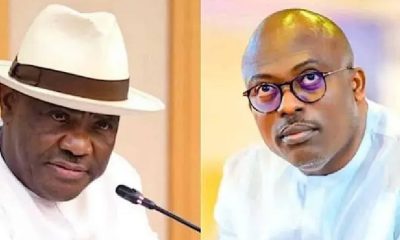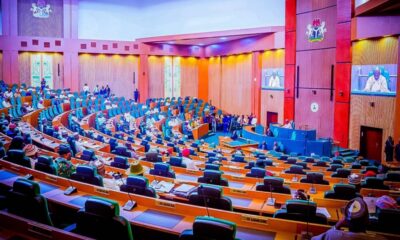Economy
CBN extends suspension of cash deposit fees to march 2025

The Central Bank of Nigeria (CBN) has once again extended the suspension of processing fees on cash deposits above N500,000 for individuals and N3,000,000 for corporates until March 31st, 2025.
This latest decision allows individuals and corporate entities to continue depositing cash exceeding these thresholds without incurring additional charges until the end of the first quarter of next year.
Banks across Nigeria have started sending out notifications to their customers, informing them of the extended grace period. This is a continuation of the CBN’s efforts to ease the burden of transaction costs on large cash deposits, initially announced earlier this year.
The suspension of fees on large cash deposits dates back to May 2024 when the CBN announced that it was halting the application of the charges outlined in its “Guide to Charges by Banks, Other Financial Institutions and Non-Bank Financial Institutions,” originally issued in December 2019.
The processing fees, set at 2 percent for individual accounts and 3 percent for corporate accounts, were previously applied to any cash deposits exceeding N500,000 and N3,000,000, respectively.
However, after briefly reinstating these charges on May 1st, 2024, some confusion arose among bank customers, who were suddenly faced with fees on their large deposits. In response, the CBN swiftly issued a new circular on May 6th, 2024.
Signed by Adetona Adedeji, Director of Banking Supervision, the circular confirmed the suspension of these fees until September 30th, 2024, a timeline that has now been extended to March 31st, 2025.
Impact of the Fee Suspension
The CBN’s decision to extend the suspension has come at a critical time for Nigeria’s banking sector. The extension of the fee suspension is widely seen as a move to encourage customers to continue depositing large sums of cash into the banking system, thereby boosting liquidity.
In line with this, banks have urged their customers to take advantage of the extended suspension. Depositors who exceed the N500,000 threshold for individuals or the N3,000,000 threshold for corporate accounts will continue to avoid the 2 percent and 3 percent processing fees previously levied on such transactions. This is expected to provide a significant relief for large depositors and encourage them to keep their funds within the formal banking system.
The decision to extend the suspension comes against the backdrop of Nigeria’s ongoing economic reforms. The CBN has been working to stabilize the financial system amid inflationary pressures, exchange rate fluctuations, and other macroeconomic challenges.
By maintaining this suspension, the CBN aims to sustain confidence in the banking sector, ensuring that both individual and corporate customers feel secure in depositing their funds without incurring additional costs.
The move is also part of broader efforts to promote financial inclusion and digital transactions. By eliminating fees on large cash deposits, the CBN hopes to encourage more Nigerians to embrace the formal banking sector, reducing the reliance on cash-based transactions.
Economy
75.5% of rural Nigerians now live below poverty line — World Bank

The World Bank has disclosed that a staggering 75.5 per cent of rural Nigerians are now living below the poverty line, reflecting deepening hardship in the country’s hinterlands.
This was revealed in the Bank’s April 2025 Poverty and Equity Brief for Nigeria, which paints a grim picture of worsening economic hardship, widening inequality, and persistent underdevelopment across much of the nation.
While poverty is widespread among urban populations, the report emphasised that the situation is significantly worse in rural areas, where economic stagnation, high inflation, and insecurity have exacerbated living conditions.
“Based on the most recent official household survey data from Nigeria’s National Bureau of Statistics, 30.9 per cent of Nigerians lived below the international extreme poverty line of $2.15 per person per day in 2018/19 before the COVID-19 pandemic,” the report stated.
The report also highlighted Nigeria’s enduring regional disparities. “Nigeria remains spatially unequal. The poverty rate in northern geopolitical zones was 46.5 per cent in 2018/19, compared with 13.5 per cent for southern ones. Inequality measured by the Gini index was estimated at 35.1 in 2018/19.
“Nigeria’s Prosperity Gap — the average factor by which individuals’ incomes must be multiplied to attain a prosperity standard of $25 per day for all — is estimated at 10.2, higher than most peers.”
Despite successive policy interventions, these figures underscore a persistent economic divide across the country.
The report’s demographic analysis found that children aged 0 to 14 years had a poverty rate of 72.5 per cent, reflecting the scale of deprivation among the youngest segment of the population.
Gender disparities were also observed, with 63.9 per cent of females and 63.1 per cent of males classified as poor under the $3.65 per day lower-middle-income threshold.
Education emerged as a significant determinant of poverty, with Nigerians lacking formal education experiencing a poverty rate of 79.5 per cent. This contrasts with 61.9 per cent for those with primary education and 50.0 per cent for secondary school graduates. Only 25.4 per cent of those with tertiary education were considered poor.
The report also drew attention to multidimensional poverty indicators, which further reflect widespread deprivation.
According to the World Bank, about 30.9 per cent of Nigerians live on less than $2.15 daily, 32.6 per cent lack access to limited-standard drinking water, 45.1 per cent do not have limited-standard sanitation, and 39.4 per cent have no electricity.
Education access remains a challenge, with 17.6 per cent of adults yet to complete primary education, and 9.0 per cent of households reporting at least one school-aged child not enrolled in school.
The report noted that even before the COVID-19 pandemic, efforts to reduce extreme poverty had largely stalled.
“Before COVID-19, extreme poverty reduction had almost stagnated, dropping by only half a percentage point annually since 2010. Living standards of the urban poor are hardly improving, and jobs that would allow households to escape poverty are lacking,” the report read.
Although the World Bank acknowledged recent economic reforms aimed at stabilising Nigeria’s macroeconomic outlook, it warned that persistently high inflation continues to undermine household purchasing power, particularly in urban areas where incomes have not kept pace with rising costs.
In light of the worsening situation, the Bank called for urgent policy action to shield vulnerable groups from inflationary shocks and to drive job creation through more productive economic activities.
Economy
Naira Records Marginal Decline Against Dollar at Official Market

The Nigerian naira experienced a mild drop in value on Friday, closing at ₦1,602.18 per dollar in the official foreign exchange market, based on figures released by the Central Bank of Nigeria (CBN).
This marks a decrease of ₦5.49 from the rate of ₦1,596.69 recorded on April 30, the last trading day before the May 1 Workers’ Day holiday—indicating a depreciation of approximately 0.34%.
Earlier in the week, from Monday to Wednesday, the naira remained relatively stable, exchanging at ₦1,599.95, ₦1,599.71, and ₦1,596.69 respectively.
Although the local currency showed some consistency mid-week, it wrapped up the week with a loss, following a sligh dip of 0.02% at the beginning of the week
Economy
Black Market Dollar hits N1,610 Amid Economic quagmire

What is the Dollar to Naira Exchange Rate in the Black Market (Also Known as the Parallel Market or Aboki FX)?
Below is the black market exchange rate for the U.S. dollar to the Nigerian naira as of Thursday, May 1, 2025. These are the typical rates at which you can exchange dollars for naira:
Dollar to Naira Black Market Exchange Rate (May 1, 2025):
At the Lagos Parallel Market, also referred to as the black market, Bureau De Change (BDC) operators are buying dollars at ₦1,602 and selling at ₦1,610, according to market sources.
Please note: The Central Bank of Nigeria (CBN) does not recognize or endorse transactions conducted on the parallel market. The CBN advises individuals and businesses seeking foreign exchange to use official banking channels.
-

 Opinion15 hours ago
Opinion15 hours agoRIVERS, WIKE, FUBARA, AND THE WAY FORWARD
-

 Politics14 hours ago
Politics14 hours agoJust in: Delta PDP Reps members defect to APC
-

 News19 hours ago
News19 hours agoVDM may be released on Tuesday
-

 News13 hours ago
News13 hours agoTension As Lawmakers Warns of Public Revolt Over Insecurity
-

 News16 hours ago
News16 hours agoNANS Barricades Lagos-Ibadan Expressway Over Alleged NELFUND Mismanagement
-

 News16 hours ago
News16 hours agoCourt bans Nnamdi Kanu’s in-law from 3 proceedings over live streaming
-

 News11 hours ago
News11 hours agoEdo Speaker, Two Other Lawmakers, Formally Join APC
-

 News23 hours ago
News23 hours agoNASS Expected To Tackle Security Challenges Upon Resumption—-Nnamchi





